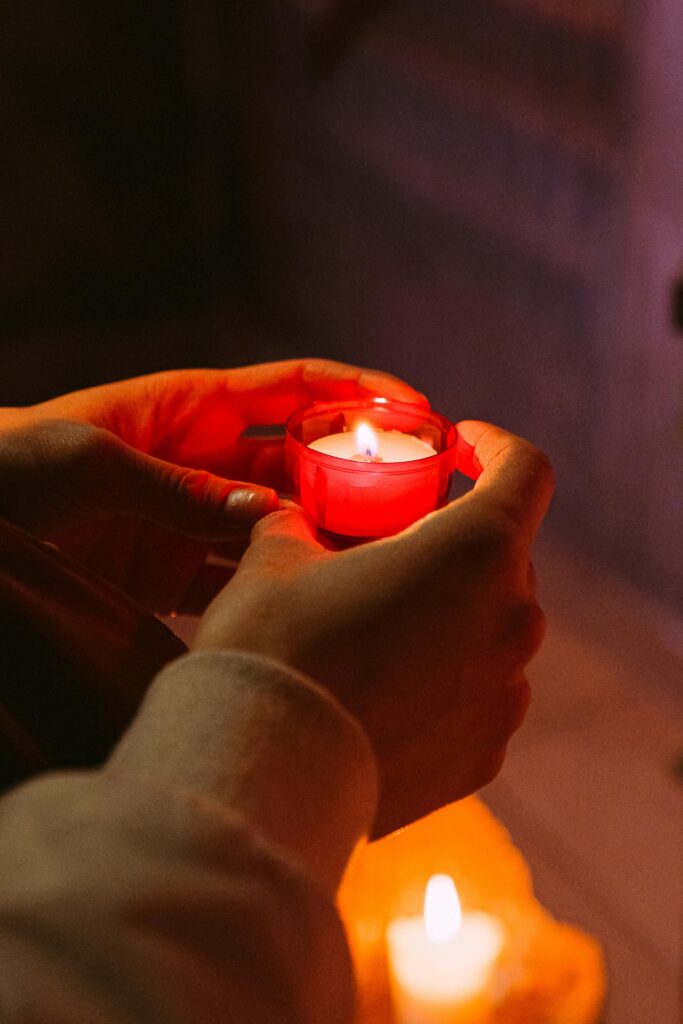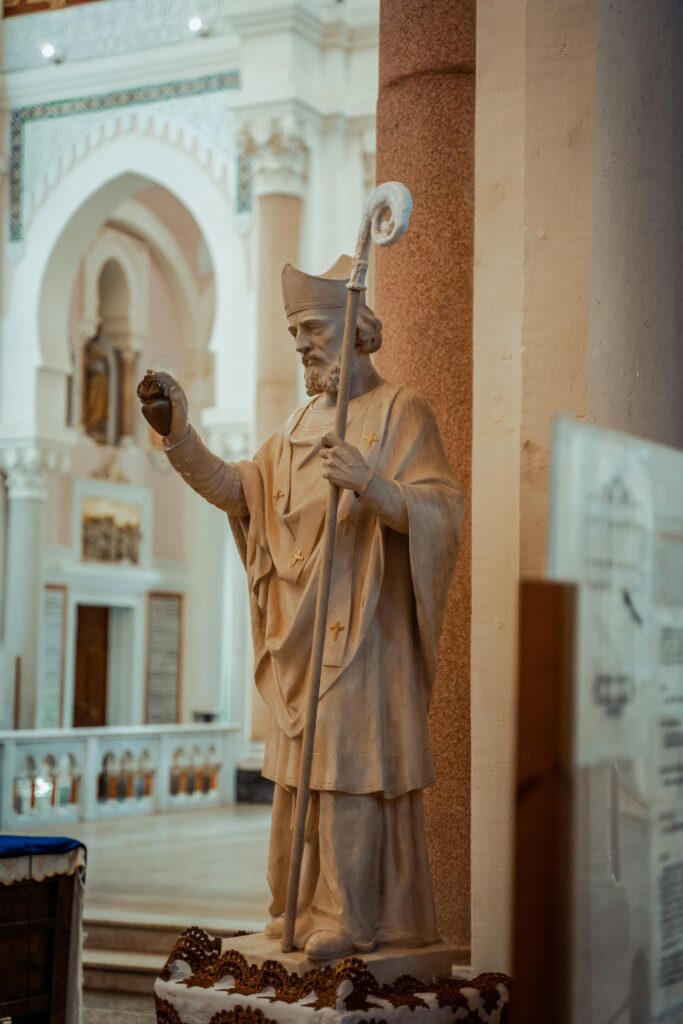Have you ever heard the saying, “There are no atheists in foxholes?” I certainly hope that you have never found yourself in a foxhole (literally or figuratively!). Still, life happens. Most of us have found ourselves in situations so dire that—religious or not—we have tried to bargain with God. But bargaining is not the same as praying.
These situations are not likely to generate any kind of lasting prayer practice. Why? Well, say God does not answer your plea in this moment. You may react by drawing one or more of the following conclusions: prayer doesn’t work, God doesn’t love me, God doesn’t exist. Now, say God does answer your foxhole plea. You’d be elated and relieved in the moment, but you likely still wouldn’t be swayed to pray more regularly going forward. Why? Because you’ve come to view prayer as something reserved for foxhole situations—a kind of get-out-of-jail-free card—rather than an ongoing relationship between you and God.
1 Thessalonians 5:17 reads, very simply, “pray without ceasing.” Three little words: simple to read, simple to write, but not quite so simple to practice. Whether you are Christian or not, prayer has been hailed across wisdom traditions as an effective technique for spiritual development.
This blog post will help you gain clarity on how to pray without ceasing your efforts, even in the midst of difficult life circumstances. By the end of this article, you’ll have deeper insight into:
- The nature and function of prayer
- How to pray
- The nature of the Divine
- How to envision the Divine during prayer
- The relationship between yourself, your prayers, and God’s will
- Mystical awareness
This exploration will help you expand your thoughts about prayer, how to pray, the Divine, God’s will, and your own self—all for the better!
Why is it so hard to pray without ceasing?
There are many mundane things that can get in the way of praying: distractions, a lack of free time, and so on. But these things are relatively easy to deal with. You can find a quiet place to pray that is free from distractions, whether that’s in your home or in a house of worship. And there is always a way to carve out a few minutes of free time in the day, however busy we might feel we are. The truly difficult hurdle to get past is doubt: doubt that prayer is effective at all, that God hears us, that God even exists. And then we loop back to our mundane concerns. “Why am I sitting here praying when I know it’s not accomplishing anything? I can be doing something more productive with my time.”
Sometimes the answer is no
There’s a saying in Carmelite spirituality: “God answers all prayers, but sometimes the answer is no.” Who says theologians don’t have a sense of humor? But there is wisdom and truth in the quip! This is one of the most important and most difficult lessons about prayer to absorb. Nobody enjoys hearing “no,” whether it’s from God, a family member, or a bank. It is especially hard, of course, to hear “no” when we’re in the foxhole. Trust me, I know what that’s like—but we’ll get into that later.

We might give God a pass when the answer is “no” to a prayer like, “Please give me a Ferrari.” Fair enough. But we feel especially indignant when a prayer like “Please save my child’s life” or “Please heal my illness” is also answered with a “no.” That’s because we believe these should be no-brainers for God: why would God want us to suffer? So, we cease to keep up with prayer in our lives, feeling as though God has violated some sort of contract with us. At the heart of that feeling, though, is a set of hubristic beliefs. We are assuming that we know how to pray to God, that we understand the nature of God, and that we understand God’s will. Let’s take a step back and examine those assumptions.
How to pray to God
What’s the right way to pray to God? That’s the million-dollar question, isn’t it? In truth, there is no right way to pray. Prayer is a deeply personal practice and, for that reason, will look different for everybody. But that doesn’t mean it’s a practice that is completely free of pitfalls. I think most of us can agree that asking God for a Ferrari is not exactly a healthy form of prayer—especially if we get upset when the answer is no! Many other obstacles can get in the way of praying healthily and productively. Learning how to identify and steer clear of these obstacles is how we learn to pray without ceasing our efforts.
How to envision God
How do you imagine God? Many of us are taught from an early age to think of God like Santa Claus. No, seriously, think about it. Grandfatherly-looking man with a big bushy beard? Lives way above or to the North? Constantly obsessing over who is naughty and who is nice? Check, check, check. And if we think of God as a person, then of course it makes sense to equate prayer with bargaining.
But in reality, God is not a person. And certainly not a Ferrari dealer. For sure, imagining God as a person can be a helpful way to connect with the divine. This is true for Christians and non-Christians alike. The scholar of religion Huston Smith explains how, for most Hindus, “the most effective ishta [preferred focus of worship] will be one of God’s incarnations, for the human heart is naturally tuned to loving people.”

From my own perspective of mystical theology, I find it useful to imagine God as a kind of energetic presence or life force animating myself and everything around me. Try picturing or feeling the force that enlivens your whole being, your body, your mind, your heart. God resides within you and is also present beyond everything imaginable. It is pure existence itself, something to tap into, rather than someone who needs to be persuaded into giving us what we want and deserve. If the term “God” itself does not suit you, it is perfectly fine to switch to a different term, like “The Divine Mind.”
The goal is not to pray to God, but to pray in God. When you pray in this way, you are making a sincere effort to understand God’s will, rather than trying to force God to bend to your will. And when you make that switch, you will discover something beautiful that will help you pray without ceasing.
What is God’s will?
The secret is that God’s will and your will are one and the same. Not the will of the “Ferarri you,” but the will of the innermost you—your true authentic self. At your core, what you desire most is the same as what God desires. So, the challenge is how you tap into your most authentic self when you pray. This is where those “no” answers can actually be not only tolerable but advantageous to your practice.
When the answer is “no,” it means that this is an opportunity for you to look at why you value what you value. Let’s say you want a promotion. You pray for it, but it fails to materialize. Take a step back. You think you want that promotion. But maybe you want something deeper. Something more spiritual, more aligned with the Divine will.
So maybe, instead of “God, help me get that promotion,” the more authentic prayer is: “God, help me to know that I am enough, help me to calm this anxiety of not being successful enough, and help me feel loved. That way, when I go for this promotion, even if I don’t get it, I have the internal strength to deal with that rejection.” St. Augustine articulates it by saying, “Prayer is the expansion of the heart and soul outward so as to receive the gift that God wants to give you.”

The most important lesson I can impart on you is this: The only prayer that should be prayed is the one that strengthens your soul and benefits your spiritual growth and the wellbeing of others. When you embrace this perspective, it becomes much easier to pray without ceasing even if things are not going your way externally.
Why do we pray?
Prayer is a lifeline that keeps you connected to your inner compass, where your truth resides, where you can hear what God is telling you to do, where you can reflect on right and wrong. It strengthens your stamina, resilience and ability to stay connected with God during hard times that tempt you away from your true essence. C.S. Lewis has some words of wisdom on this subject:
“Faith […] is the art of holding on to things your reason has once accepted, in spite of your changing moods.”
C.S. Lewis, Mere Christianity
Translation: shit happens. Prayer will not change that. But it will change your orientation to life’s external circumstances. And it will help you grow spiritually.
Prayer is a crucible that strips you of false desires and orients you towards your deepest desire. Theologians have a word for this. It’s “impetration,” from the Latin word “impetratio.” It means that if you come to pray with the right attitude, then invariably you will obtain that which you seek, provided it is for your spiritual advantage.
Prayers for healing
Now, let’s jump back into the foxhole. Remember those hypothetical prayers for healing I invoked earlier? In my case, it was more than just hypothetical.
When I was diagnosed with cancer, my first instinct was to pray for God to heal me. Obviously, we all want to say, “Of course we should be praying for God to heal major illnesses.” In my case, it was my own health that was at stake. For you, your desire to pray for healing may result from heartbreak, the death of a loved one, divorce, betrayal, rejection, or a loss of some other kind. We have all been in situations where we’re faced with what feels like insurmountable pain.

In pausing for a moment and thinking about my own situation, I learned so much about the nature of prayer, about who God is, and about what I’m really here for.
Instead of praying to get better, I asked myself: will being cured of cancer help me grow spiritually? Develop my sense of integrity? Make me a more compassionate and understanding person? Will surviving cancer cultivate reverence for God or inner fortitude? It was really, really, really hard for me to be honest with myself and listen to the answer because the answer was…no.
The gift of life: an unceasing prayer
I wouldn’t wish cancer on anyone. But having cancer actually helped me grow spiritually. Because it put me in a helpless situation that I had no control over.
For me, the best part wasn’t surviving cancer. It was experiencing the true joy of being liberated from the desire to survive, and instead just vivaciously enjoying every moment as a gift. I would have died happy because I learned what it means to be fully alive while facing death. That was a much better lesson to learn than, “Pray because praying to God may increase your chances of survival.”
You can, instead, live your whole life as a prayer. That is what it means to pray without ceasing.
In the words of Ignatius of Loyola,
“Take, O Beloved Lord, all my liberty,
St. Ignatius of Loyola, “Suspice Prayer”
my memory, my understanding,
and my entire will.
I surrender all of my decisions and my freedom to choose.
All that I am and all that I have,
is only mine because You gave it to me;
and now, I return everything to You.
All that I ask is that You keep giving me your Love.
Hold on to me so I know you’re there.
That is enough for me.
I neither need nor want anything else.
Amen.”
Don’t pray for outcomes. Pray for the maturing of your soul. In the end, this is what matters.
Embracing mystical awareness through prayer
I remember stepping outside for the first time after my surgery into the gardens of the hospital. The birdsong was the most beautiful sound I ever heard. I closed my eyes and listened. Little things. The way the clouds glide across the sky can move you to tears. How the expansion and contraction of your lungs somehow connects you with the way the universe expands and contracts.
In moments when we are hyper-aware of life’s fragility and its preciousness, it’s as if we step outside of time and we notice everything for the first time. This is mystical awareness. It’s a transcendent union with the entire manifest world, a seamless interconnection that culminates into a singular sensation of overwhelming totality.

This may not happen to you the first time you make a serious effort to pray. That’s okay! There are levels to prayer and each layer of depth has its own native language. You can’t have a conversation with God at that level unless you’re fluent in the language. And, as with any language, you have to start from the ground up.
The important thing is to go on praying without ceasing. When you probe the depths of prayer and discover your deepest desire, it’s so joyful and empowering that you can feel your soul sizzle. That may sound weird, but it’s the best way I can describe it. As I said before, it’s like you’re no longer praying to the Divine. You’re praying in the Divine because you’ve entered into communion with the Mind of God. You’re stepping into what God wants for you. Which is also what you want for you. Even if you didn’t know it at first.
Frequently Asked Questions
What does it mean to pray without ceasing?
To pray without ceasing means more than just keeping up with your prayer practice. This statement is a call to fundamentally reimagine how you pray to God. It means cultivating a deep, continuous dialogue with the divine that transcends formal prayer settings. It involves nurturing an awareness and presence that transform everyday actions into sacred interactions. This ongoing conversation invites mindfulness into routine activities, ensuring that one’s intentions align with spiritual values. By integrating a “prayerful mindset” into all aspects of life, each moment becomes a chance to express gratitude, seek guidance, and offer love, turning ordinary experiences into extraordinary encounters with the divine.
It is important to pray without ceasing so that we don’t lose sight of the purpose and function of prayer. It’s not just about praying when you want or need something. Prayer is how you continuously foster your relationship with God.
1 Thessalonians 5:17 is the verse in the Bible in which Paul says to pray without ceasing and to give thanks to God in all circumstances.
Paragraph
Paragraph



